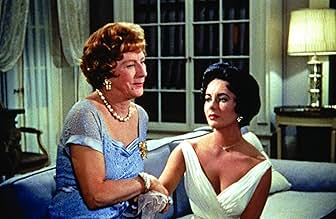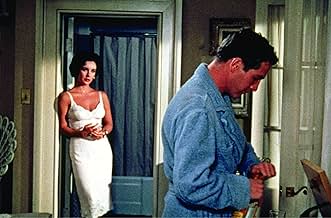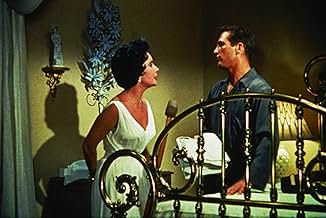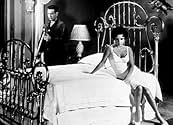CALIFICACIÓN DE IMDb
7.9/10
56 k
TU CALIFICACIÓN
Brick, un ex-jugador de fútbol alcohólico, resiste las afecciones de su mujer Maggie. Se reúne con su padre, enfermo de cáncer, y sus memorias compartidas se convierten en revelaciones para ... Leer todoBrick, un ex-jugador de fútbol alcohólico, resiste las afecciones de su mujer Maggie. Se reúne con su padre, enfermo de cáncer, y sus memorias compartidas se convierten en revelaciones para padre e hijo.Brick, un ex-jugador de fútbol alcohólico, resiste las afecciones de su mujer Maggie. Se reúne con su padre, enfermo de cáncer, y sus memorias compartidas se convierten en revelaciones para padre e hijo.
- Dirección
- Guionistas
- Elenco
- Nominado a 6 premios Óscar
- 3 premios ganados y 16 nominaciones en total
Zelda Cleaver
- Sookey
- (sin créditos)
Brian Corcoran
- Boy
- (sin créditos)
Hugh Corcoran
- Buster
- (sin créditos)
Kevin Corcoran
- Child
- (sin créditos)
Patty Ann Gerrity
- Dixie
- (sin créditos)
Bobby Johnson
- Pollitt Groom
- (sin créditos)
Walter Merrill
- Party Guest
- (sin créditos)
Deborah Miller
- Trixie
- (sin créditos)
Robert 'Rusty' Stevens
- Sonny
- (sin créditos)
Vince Townsend Jr.
- Lacey
- (sin créditos)
- Dirección
- Guionistas
- Todo el elenco y el equipo
- Producción, taquilla y más en IMDbPro
Opiniones destacadas
Elizabeth Taylor's death a few days ago prompted me to watch one of her most famous movies.* I've never seen a stage production of Tennessee Williams's "Cat on a Hot Tin Roof", but I will say that the movie version is worth seeing, despite the unrealistic southern accents. The storm taking place outside the mansion is nothing compared to the tension between all the family members gathering for the patriarch's birthday.
As with another notable Tennessee Williams play -- "A Streetcar Named Desire" -- they had to remove the references to homosexuality to bring the movie to the silver screen. Still, the scenes of Maggie (Taylor) in her slip seem as though they would have been risqué for the time. Along with her, just about every character made me feel as if my throat was going to constrict. In a way, it's as if the only truly benign characters were the servants.
All in all, I wouldn't call this movie a supreme masterpiece, but I found it to be worth seeing. This one, along with "Streetcar" and "Baby Doll" are the three great adaptations of Tennessee Williams plays. Also starring Paul Newman, Burl Ives, Judith Anderson (Mrs. Danvers in "Rebecca"), Jack Carson and Madeleine Sherwood (Reverend Mother on "The Flying Nun").
*This is going to sound insane, but prior to "COAHTR", the only movie in which I'd seen Elizabeth Taylor was the god-awful "Flintstones" movie, in which she played Wilma's mother.
As with another notable Tennessee Williams play -- "A Streetcar Named Desire" -- they had to remove the references to homosexuality to bring the movie to the silver screen. Still, the scenes of Maggie (Taylor) in her slip seem as though they would have been risqué for the time. Along with her, just about every character made me feel as if my throat was going to constrict. In a way, it's as if the only truly benign characters were the servants.
All in all, I wouldn't call this movie a supreme masterpiece, but I found it to be worth seeing. This one, along with "Streetcar" and "Baby Doll" are the three great adaptations of Tennessee Williams plays. Also starring Paul Newman, Burl Ives, Judith Anderson (Mrs. Danvers in "Rebecca"), Jack Carson and Madeleine Sherwood (Reverend Mother on "The Flying Nun").
*This is going to sound insane, but prior to "COAHTR", the only movie in which I'd seen Elizabeth Taylor was the god-awful "Flintstones" movie, in which she played Wilma's mother.
Much has been made of the differences between Tennessee Williams' play and this film--the homoerotic themes have been driven further into subtext (though not eliminated entirely) and a more upbeat ending was added. The changes were necessary when the film was made; although theater and literary purists decry the "sanitizing" or censorship of plays when they are adapted for the screen, in some cases (such as this one) the changes can improve the work in question. "Cat" on film is clearer, for one thing. Tennessee Williams plays tend to be "cluttered" in their original form. They are also cynically downbeat; if that type of story appeals to one, this adaptation might be off-putting.
As with all theatrical adaptations, many of the scenes are excessively talky, especially the Brick/Big Daddy scenes in the second act. Some of the highlights are just as wordy but thoroughly enjoyable rather than tedious (especially Maggie's story about Mae's reign as Cotton Carnival Queen and the entire scene in the basement). All of the performances are excellent, though Paul Newman as Brick is less flashy; it's not really until the basement scene that one feels his talent is given a workout. Elizabeth Taylor is an emotional rollercoaster, venturing from flirtatious to hectoring to wheedling to calm to grasping to tender, often within a single scene, and yet she never slips the rails. Watching films from this period (her career peak), one wonders what happened to turn her into the vague, bleary-eyed woman we see today. Judith Anderson's Big Mama is loud, coarse, and bossy, but completely sympathetic both in the scene with the birthday cake and in the confrontation scene at the end. When Big Daddy invites her along with him at the end, it is every bit as welcome to the viewer as it is to her. Burl Ives is the most towering of all; the emotional growth in the film is as much his as it is Brick's. Jack Carson and Madeleine Sherwood are every bit as good despite being relegated to comic relief at times.
My favorite aspect of this story, however, is the social dynamic. Brick and Maggie are spoiled, young, "beautiful people" who have yet to take on any responsibility, while Gooper and Mae are the epitome of a serious young family. Brick is an alcoholic former football player, while Gooper is a corporate lawyer. Despite these obvious differences, however, both their parents and the audience (and Tennessee Williams, obviously) clearly prefer Brick and Maggie. Every aspect of Gooper and Mae's personalities, even those which bespeak traditional values, are portrayed as petty and unimaginative. Even if one believes that Gooper and Mae have done all the right things, they have done them for the wrong reasons. Thus the theme of the story is most clearly presented: all that is important is to love and to express that love.
As with all theatrical adaptations, many of the scenes are excessively talky, especially the Brick/Big Daddy scenes in the second act. Some of the highlights are just as wordy but thoroughly enjoyable rather than tedious (especially Maggie's story about Mae's reign as Cotton Carnival Queen and the entire scene in the basement). All of the performances are excellent, though Paul Newman as Brick is less flashy; it's not really until the basement scene that one feels his talent is given a workout. Elizabeth Taylor is an emotional rollercoaster, venturing from flirtatious to hectoring to wheedling to calm to grasping to tender, often within a single scene, and yet she never slips the rails. Watching films from this period (her career peak), one wonders what happened to turn her into the vague, bleary-eyed woman we see today. Judith Anderson's Big Mama is loud, coarse, and bossy, but completely sympathetic both in the scene with the birthday cake and in the confrontation scene at the end. When Big Daddy invites her along with him at the end, it is every bit as welcome to the viewer as it is to her. Burl Ives is the most towering of all; the emotional growth in the film is as much his as it is Brick's. Jack Carson and Madeleine Sherwood are every bit as good despite being relegated to comic relief at times.
My favorite aspect of this story, however, is the social dynamic. Brick and Maggie are spoiled, young, "beautiful people" who have yet to take on any responsibility, while Gooper and Mae are the epitome of a serious young family. Brick is an alcoholic former football player, while Gooper is a corporate lawyer. Despite these obvious differences, however, both their parents and the audience (and Tennessee Williams, obviously) clearly prefer Brick and Maggie. Every aspect of Gooper and Mae's personalities, even those which bespeak traditional values, are portrayed as petty and unimaginative. Even if one believes that Gooper and Mae have done all the right things, they have done them for the wrong reasons. Thus the theme of the story is most clearly presented: all that is important is to love and to express that love.
The best thing Cat on a Hot Tin Roof has going for it is one truly remarkable acting performance. And that performance comes from neither Elizabeth Taylor nor Paul Newman. There's nothing wrong with the work turned in by Taylor and Newman, they are both perfectly fine in their roles. And it is their characters who are the focus for most of the film. But late on in the proceedings Burl Ives grabs hold of the film and makes it his own. Ives turns in a performance which is so strong and powerful that it threatens to overshadow and overwhelm everything else in the film. However it is rather difficult to overshadow Elizabeth Taylor and Paul Newman. And the film's rather simple story is certainly compelling enough so as not to be overwhelmed by the Ives tour de force near the end. So while Ives may end up being the most memorable thing the film has to offer he is certainly not the only memorable thing. His great performance is merely the best part of what is an overall thoroughly satisfying film.
The film's simple story centers around a day in the life of a wealthy Southern family. With this family the key word is "mendacity". What does that even mean? Any of our characters who initially don't know about mendacity surely will by the time the story plays itself out. As we meet them everyone has come together to celebrate the 65th birthday of family patriarch Big Daddy. Initially it seems the film is about Big Daddy's son Brick and his wife Maggie the Cat. Brick and Maggie are not currently in the throes of wedded bliss. To say their relationship is strained would be putting it mildly. The fact that alcohol seems to be the only thing in life Brick is at all interested in probably does not help matters. But as the film progresses we see there is a larger issue than Brick and Maggie's troubled marriage. Big Daddy is dying. And nobody, not his family and not his doctors, has the guts to tell him. This will ultimately play itself out in powerful, heartrending fashion.
For much of the film's running time you would call it compelling but certainly not spectacular. But then Ives, as Big Daddy, grabs the film by its throat and shakes some real life into it. There's a scene where Ives as Big Daddy and Newman as Brick are alone in a basement which simply could not have been performed any better. There's so much these characters have to say to one another. The emotion is raw and the scene is so powerful. It hits you right in the heart. Just this one scene alone, with these two great actors, elevates the film all by itself. Newman is terrific. Ives is astounding. Perhaps it is in fact possible to overshadow Elizabeth Taylor. Maybe just this once. Maggie the Cat is an intriguing character in her own right and Taylor certainly doesn't disappoint in the role. But it turns out that ultimately the film is really about the relationship between Brick and his father, not Brick and his wife. And as such it is Newman, and most especially Ives, who you will most remember. It is their work which transforms a good movie into something truly memorable.
The film's simple story centers around a day in the life of a wealthy Southern family. With this family the key word is "mendacity". What does that even mean? Any of our characters who initially don't know about mendacity surely will by the time the story plays itself out. As we meet them everyone has come together to celebrate the 65th birthday of family patriarch Big Daddy. Initially it seems the film is about Big Daddy's son Brick and his wife Maggie the Cat. Brick and Maggie are not currently in the throes of wedded bliss. To say their relationship is strained would be putting it mildly. The fact that alcohol seems to be the only thing in life Brick is at all interested in probably does not help matters. But as the film progresses we see there is a larger issue than Brick and Maggie's troubled marriage. Big Daddy is dying. And nobody, not his family and not his doctors, has the guts to tell him. This will ultimately play itself out in powerful, heartrending fashion.
For much of the film's running time you would call it compelling but certainly not spectacular. But then Ives, as Big Daddy, grabs the film by its throat and shakes some real life into it. There's a scene where Ives as Big Daddy and Newman as Brick are alone in a basement which simply could not have been performed any better. There's so much these characters have to say to one another. The emotion is raw and the scene is so powerful. It hits you right in the heart. Just this one scene alone, with these two great actors, elevates the film all by itself. Newman is terrific. Ives is astounding. Perhaps it is in fact possible to overshadow Elizabeth Taylor. Maybe just this once. Maggie the Cat is an intriguing character in her own right and Taylor certainly doesn't disappoint in the role. But it turns out that ultimately the film is really about the relationship between Brick and his father, not Brick and his wife. And as such it is Newman, and most especially Ives, who you will most remember. It is their work which transforms a good movie into something truly memorable.
"Cat on a Hot Tin Roof" is truly an actor's movie, and it is one of those rare films where every single actor is perfect.
Paul Newman and Elizabeth Taylor are both brilliant as Brick and Maggie Pollitt, respectively. Not very often is there a screen couple that have the same chemistry together that they do.
Newman, however, steals the show. If you watch "Cat on a Hot Tin Roof" for nothing else, watch it for his performance. One of the greatest actors of all time, Newman showcases how powerful an actor he can be. This is not to say the supporting cast isn't excellent. Burl Ives is superb in a supporting role as Big Daddy, a man who's greatest concern is having his legacy live on after him. The sequence with Ives and Newman in the basement of the house remains one of the most incredible displays of acting I have ever seen.
"Cat on a Hot Tin Roof" is a very appropriate title. It is a searing, wonderfully acted film that I will not soon forget. I recommend those who haven't seen it yet to rent it as soon as they get a chance. A true classic.
Paul Newman and Elizabeth Taylor are both brilliant as Brick and Maggie Pollitt, respectively. Not very often is there a screen couple that have the same chemistry together that they do.
Newman, however, steals the show. If you watch "Cat on a Hot Tin Roof" for nothing else, watch it for his performance. One of the greatest actors of all time, Newman showcases how powerful an actor he can be. This is not to say the supporting cast isn't excellent. Burl Ives is superb in a supporting role as Big Daddy, a man who's greatest concern is having his legacy live on after him. The sequence with Ives and Newman in the basement of the house remains one of the most incredible displays of acting I have ever seen.
"Cat on a Hot Tin Roof" is a very appropriate title. It is a searing, wonderfully acted film that I will not soon forget. I recommend those who haven't seen it yet to rent it as soon as they get a chance. A true classic.
There are tensions that have built between a couple, Brick Pollitt shows contempt, it's far from subtle, his wife Maggie's in despair, she's in love and really cares, but it's fair to say this pairing, is in trouble. Big Daddy joins the party for his birthday, but the whiskey being drunk just goes down one way, secrets hidden and withheld, relationships are hewn and felled, wounds reopened, from a friend, lost through betray. At the climax of this film you'll hold your breath, as the family is overwhelmed, distressed, with performances profound, so much lost and so much found, you will not be disappointed, I attest.
Three of the greatest cinematic performances placed on film.
Three of the greatest cinematic performances placed on film.
¿Sabías que…?
- TriviaDespite being really affected by her husband Mike Todd's death, Elizabeth Taylor resumed her job in a very professional way, without any delay on the set. Everyone was astonished by her determination.
- ErroresAfter Brick tries to drive away and gets stuck, Maggie goes out to him and helps him into the house through the pouring rain. Her hair is soaking wet, but the next time she is seen, it's perfectly dry and styled.
- Citas
Harvey 'Big Daddy' Pollitt: I've got the guts to die. What I want to know is, have you got the guts to live?
- ConexionesEdited into Hollywood: The Dream Factory (1972)
Selecciones populares
Inicia sesión para calificar y agrega a la lista de videos para obtener recomendaciones personalizadas
Detalles
- Fecha de lanzamiento
- País de origen
- Idioma
- También se conoce como
- Cat on a Hot Tin Roof
- Locaciones de filmación
- Metro-Goldwyn-Mayer Studios - 10202 W. Washington Blvd., Culver City, California, Estados Unidos(studio: made in Hollywood, U.S.A. by)
- Productora
- Ver más créditos de la compañía en IMDbPro
Taquilla
- Presupuesto
- USD 3,000,000 (estimado)
- Total a nivel mundial
- USD 1,872
- Tiempo de ejecución
- 1h 48min(108 min)
- Color
- Relación de aspecto
- 1.85 : 1
Contribuir a esta página
Sugiere una edición o agrega el contenido que falta
































